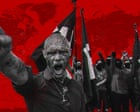
Across the globe, different regions are experiencing significant events, each with its own challenges and implications for international communities. From socio-political movements in North America to humanitarian crises in the Middle East, the world’s stage presents both opportunities for change and calls for compassionate action.
In North America, a concerning trend of ideologically extreme ‘fight clubs’ is emerging. These ‘active clubs,’ as they are known, use martial arts to propagate far-right and fascist ideals. Recently, a group gathered in London, Canada, obscured by masks and sunglasses, to disseminate messages calling for mass deportations and other divisive slogans. Such groups are gaining traction not only in the United States but also globally, indicating an urgent need for social dialogue and conflict resolution strategies.
In Russia’s far east, tragedy struck as a Soviet-era passenger plane operated by Angara Airlines crashed while approaching its destination, leading to the loss of 48 lives. The incident underscores the ongoing challenges faced by countries with aging aviation infrastructure and emphasizes the need for robust regulatory frameworks to ensure passenger safety.
Turning to the Middle East, Gaza remains a focal point of international concern. Philippe Lazzarini, head of the United Nations Relief and Works Agency (Unrwa), has highlighted the dire humanitarian conditions, with one in five children in Gaza suffering from malnutrition. Unrwa is prepared with 6,000 aid trucks ready to deliver essential supplies, though political complexities have stalled the relief efforts. Simultaneously, reports of Israeli fire resulting in the deaths of Palestinian teenagers further underscore the region’s volatility.
The humanitarian situation is further complicated by the dwindling resources available to journalists operating in Gaza. Major news organizations like BBC, AFP, and Reuters have joined voices, stressing the difficulties faced by reporters who are struggling to access basic necessities such as food and water amid the ongoing crisis. This plea for enabling media to function unfettered highlights the critical role of journalism in conflict zones.
In Saudi Arabia, reports have emerged of travel restrictions imposed on women’s rights activists like Loujain al-Hathloul and Maryam al-Otaibi, aimed at curtailing their ability to voice dissent beyond borders. These measures, which extend to family members, have drawn criticism from human rights organizations. Such actions emphasize the nuanced balance between governance and freedom of expression in the region.
In the United Kingdom, the arrest of an 80-year-old pro-Palestine protester in Cardiff, who was held for almost 27 hours, spotlights tensions between state policies and citizen-led demonstrations. This incident raises questions about the broader implications of protest laws and the rights of individuals to express political opposition.
Meanwhile, in the United States, nearly 150 staff members from the National Science Foundation (NSF) have openly criticized budget cuts under the Trump administration. They describe these cuts as politically driven and detrimental to the nation’s scientific leadership. The NSF’s commitment to uphold constitutional values reflects a broader conversation on the importance of maintaining scientific integrity amidst political change.
These diverse narratives from around the world reveal the interconnectedness of social, political, and humanitarian issues. They remind us of our shared responsibilities and the importance of thoughtful, global cooperation in addressing the challenges of our times.
Source: {link}
